
Journal of Fungi
Scope & Guideline
Unveiling Nature's Fungal Mysteries
Introduction
Aims and Scopes
- Fungal Ecology and Diversity:
Research on the diversity of fungi in various ecosystems, their ecological roles, and their interactions with other organisms, including plants and animals. - Fungal Pathogenesis and Disease:
Studies exploring the mechanisms of fungal infections in humans and other organisms, including the identification of virulence factors and antifungal resistance. - Biotechnology and Industrial Applications:
Investigations into the use of fungi in biotechnological applications, including the production of enzymes, bioactive compounds, and biocontrol agents. - Genomics and Molecular Biology:
Research focused on the genomic and molecular characterization of fungi, including the study of gene expression, metabolic pathways, and genetic manipulation techniques. - Environmental Mycology and Bioremediation:
Exploration of the role of fungi in environmental processes, including their use in bioremediation of contaminated environments and their interactions with pollutants. - Medicinal Fungi and Pharmacology:
Studies on the pharmacological properties of fungi, including their potential as sources of new drugs and therapeutic agents. - Mycorrhizal Fungi and Plant Interactions:
Research on the interactions between mycorrhizal fungi and plants, focusing on nutrient uptake, plant growth promotion, and stress tolerance.
Trending and Emerging
- Antifungal Drug Resistance:
There is a growing focus on understanding antifungal resistance mechanisms, particularly in clinically significant species like Candida auris, driven by the increasing incidence of invasive fungal infections. - Fungal Contributions to Climate Change Mitigation:
Research exploring the role of fungi in carbon cycling and their potential applications in bioremediation and environmental sustainability has gained momentum. - Fungal Interactions with the Human Microbiome:
The intersection of mycology with microbiome research is emerging as a significant area of study, particularly regarding gut fungi and their roles in human health and disease. - Synthetic Biology and Genetic Engineering of Fungi:
Recent advancements in genetic manipulation techniques, including CRISPR/Cas9, are paving the way for innovative applications of fungi in biotechnology. - Emerging Fungal Pathogens and Zoonotic Diseases:
There is increasing attention on newly identified fungal pathogens and their zoonotic potential, particularly in the context of global pandemics and changing ecosystems. - Environmental Mycology and Fungal Ecology:
Research into the ecological roles of fungi, particularly in relation to biodiversity conservation and ecosystem services, is becoming more prominent. - Fungal Metabolomics and Secondary Metabolite Research:
The exploration of secondary metabolites produced by fungi and their bioactivities has expanded, with implications for both pharmacology and agriculture.
Declining or Waning
- Traditional Fungal Taxonomy:
There is a noticeable decline in papers focusing solely on traditional taxonomic classifications, as the field moves towards more integrated approaches utilizing molecular techniques. - Fungal Biopesticides:
Interest in fungal biopesticides appears to be waning as researchers explore more diverse and innovative biocontrol methods, including bacterial and plant-based solutions. - Fungal Pathogen Resistance Mechanisms:
While still relevant, the exploration of resistance mechanisms in a purely descriptive context has decreased in favor of more dynamic studies involving host-pathogen interactions and environmental factors. - Studies on Historical Fungal Uses:
Research focusing on historical uses of fungi in traditional medicine or ancient practices has become less prevalent as the journal emphasizes contemporary applications and scientific validation. - Isolation Studies of Environmental Fungi:
The focus on merely isolating and identifying environmental fungi has decreased, reflecting a shift towards understanding their functional roles and interactions in ecosystems.
Similar Journals
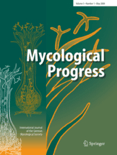
MYCOLOGICAL PROGRESS
Connecting scientists to shape the future of fungal science.MYCOLOGICAL PROGRESS, published by SPRINGER HEIDELBERG, is an esteemed journal dedicated to advancing the field of mycology and associated biological disciplines. With an ISSN of 1617-416X and an E-ISSN of 1861-8952, this journal has established itself as a leading source of high-quality research, evidenced by its impressive rankings in the Q1 quartile across various categories such as Agricultural and Biological Sciences, Ecology, and Plant Science. As of 2023, MYCOLOGICAL PROGRESS ranks 37 out of 193 in Agricultural and Biological Sciences (miscellaneous) and 183 out of 721 in Ecology, demonstrating its significant impact in the ecosystem of scientific literature. This journal not only aims to disseminate innovative research findings but also strives to foster interdisciplinary collaboration among scientists, ecologists, and agriculturists around the globe. While retaining a traditional model of publication, MYCOLOGICAL PROGRESS remains crucial for those seeking to deepen their understanding of fungal biology and its broader environmental implications.

Egyptian Journal of Botany
Empowering researchers to shape the future of botany.Egyptian Journal of Botany is a premier publication in the field of botanical sciences, encompassing agricultural research, plant biology, and ecology. Published by the NATL INFORMATION DOCUMENTATION CENT, ACAD SCIENTIFIC RESEARCH & TECHNOLOGY in Egypt, this journal has made significant strides since its establishment, now recognized within several prestigious Scopus quartiles including Q3 in Agronomy and Crop Science, and Q3 in Ecology, reflecting its impact and relevance in the scientific community. With an aim to disseminate high-quality research and foster innovation in plant sciences, the journal provides a platform for researchers, professionals, and students alike to share vital findings and advancements. Although it currently operates under traditional access, the wealth of knowledge it offers is pivotal for those engaged in ecological preservation, crop improvement, and biotechnological applications. With its comprehensive scope and evolving reputation, the Egyptian Journal of Botany is poised to remain an influential player in the botanical sciences from 2019 to 2024 and beyond.
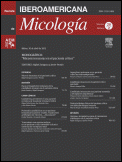
REVISTA IBEROAMERICANA DE MICOLOGIA
Bridging Gaps in Mycology for a Healthier FutureREVISTA IBEROAMERICANA DE MICOLOGIA, published by the ASOCIACION ESPANOLA MICOLOGIA-AEM, is a vital resource for those engaged in the study of mycology and infectious diseases. With a history spanning from 1996 to 2024, this journal is committed to advancing knowledge in the field through the dissemination of high-quality research articles, reviews, and case studies. Although it currently features a Q3 ranking in Infectious Diseases and a Q4 ranking in Microbiology for 2023, its impact is significant given the niche focus it serves, catering to a specialized audience of researchers and practitioners. While access is not open, the journal continues to be a preferred platform for scholarly communication among professionals in Spain and beyond. The editorial office, located in Bilbao, serves as the hub for rigorous peer-review and publication processes, ensuring that the latest advancements and findings in the field of mycology are effectively shared within the scientific community.

Medical Mycology Journal
Bridging Research and Practice in Medical MycologyMedical Mycology Journal is a leading publication in the field of medical mycology, dedicated to advancing the understanding and treatment of fungal infections. Published by the Japanese Society of Medical Mycology, this journal serves as an essential resource for researchers, clinicians, and students alike. With an ISSN of 2185-6486 and an E-ISSN of 2186-165X, it aims to provide high-quality peer-reviewed articles focusing on clinical and epidemiological studies, diagnosis, and novel therapeutic approaches related to fungal pathogens. Operating under a Q3 ranking in Infectious Diseases and having consistently published significant findings since its establishment in 2011, the journal is pivotal for those working at the intersection of mycology and infectious disease management. Although currently non-open access, the journal's insights are vital for expanding knowledge in this critical area of healthcare, addressing pressing global health challenges linked to fungal infections.
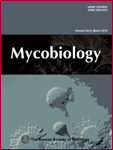
MYCOBIOLOGY
Pioneering Discoveries in Health and AgricultureMYCOBIOLOGY is an esteemed open-access journal published by Taylor & Francis Ltd, specializing in the fields of Infectious Diseases, Microbiology, and Plant Science. Since its inception, the journal has provided a platform for innovative research, showcasing a diverse range of studies that delve into the complexities of mycology and its vast implications on health, agriculture, and the environment. With a commendable impact factor and a Q2 ranking in Plant Science as of 2023, MYCOBIOLOGY facilitates the dissemination of vital findings to a global audience of researchers, professionals, and students. In addition to its commitment to high-quality content, MYCOBIOLOGY has embraced open access since 2018, ensuring that the latest advancements in mycological research are readily available to the academic community and the public. By bridging gaps in knowledge and fostering collaboration across disciplines, MYCOBIOLOGY plays a crucial role in advancing our understanding of fungal biology and its myriad applications.

Botany
Fostering global knowledge in plant sciences.Botany is a premier academic journal published by Canadian Science Publishing, dedicated to advancing the understanding of plant sciences and ecological systems. With an ISSN of 1916-2790 and an E-ISSN of 1916-2804, this journal has established itself as a respected publication in the fields of Ecology, Evolution, Behavior and Systematics, and Plant Science, reflected in its 2023 Q2 and Q3 rankings. Covering a wide range of topics, Botany is committed to fostering interdisciplinary research, promoting innovative methodologies, and disseminating significant findings from both theoretical and applied perspectives. Based in Ottawa, Canada, the journal is open access, ensuring that high-quality research is accessible to a global audience, thereby playing a crucial role in the dissemination of knowledge in the scientific community. With convergence years from 2008 to 2024, it continues to evolve alongside the scientific advancements in botanical studies, making it an essential resource for researchers, professionals, and students alike.
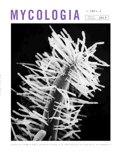
MYCOLOGIA
Advancing fungal research for a sustainable future.MYCOLOGIA, published by Taylor & Francis Inc, is a prestigious journal that has been at the forefront of fungal research since its inception, with converging years of publication from 1945 to 2024. This interdisciplinary journal, identified by ISSN 0027-5514 and E-ISSN 1557-2536, stands out in various scientific categories, achieving Q1 rankings in Ecology, Evolution, Behavior and Systematics, as well as Plant Science, alongside strong performances in Cell Biology and Molecular Biology categories. With an impact factor that reflects its significance in the field, MYCOLOGIA appeals to a diverse audience, including researchers, professionals, and students dedicated to advancing the understanding of fungal biology and its ecological implications. Notably, while it does not currently operate under an Open Access model, the journal remains a vital resource for those pursuing groundbreaking discoveries in mycology and related disciplines.

SYDOWIA
Fostering Innovation in Botanical and Ecological ResearchSYDOWIA is a prestigious academic journal based in Austria, published by Verlag Ferdinand Berger Sohne Gesellschaft mbH, that has been a cornerstone of scientific publishing since its establishment in 1996. With an ISSN of 0082-0598, SYDOWIA focuses on critical research in the fields of Ecology, Evolution, Behavior and Systematics as well as Plant Science, earning a notable classification in Category Quartiles with Q3 in Ecology-related disciplines and Q2 in Plant Science for 2023. The journal’s strategic insights into agricultural and biological sciences have secured a place within the Scopus rankings, where it holds the position of #191 out of 516 in Plant Science and #278 out of 721 in Ecology categories—reflecting its growing influence with a percentile standing of 63rd and 61st, respectively. Although SYDOWIA is not an Open Access journal, it continues to thrive in delivering scholarly articles that promote advancement and innovation in ecological and botanical research. Researchers, professionals, and students alike can rely on SYDOWIA as a vital resource for disseminating knowledge and fostering exploration in these essential scientific domains.
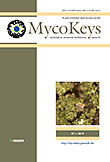
MycoKeys
Unlocking the secrets of fungi for ecological innovation.MycoKeys, published by PENSOFT PUBLISHERS, is a leading open-access journal dedicated to advancing the understanding of fungal biology and its diverse implications within agricultural, ecological, and biological sciences. With its ISSN 1314-4057 and E-ISSN 1314-4049, this journal has achieved remarkable academic prestige, reflected in its 2023 Scopus rankings placing it in the first quartile (Q1) across several categories, including Agricultural and Biological Sciences (miscellaneous), Ecology, Evolution, Behavior and Systematics, and Plant Science. MycoKeys provides a platform for researchers, professionals, and students interested in the latest findings and methodologies regarding fungi, their environments, and their interactions within various ecosystems. Since its transition to open access in 2011, the journal has championed the dissemination of high-quality research to a global audience, fostering collaboration and innovation in mycology. With a publishing history that converges from 2015 to 2024, MycoKeys remains a vital resource for those committed to exploring the multifaceted roles fungi play in our world.

Malaysian Journal of Microbiology
Championing Innovation in Microbiology and BiotechnologyMalaysian Journal of Microbiology is a prestigious open-access journal dedicated to advancing the field of microbiology, published by the Malaysian Society for Microbiology. Since its inception in 2005, this journal has become an essential platform for researchers and practitioners, facilitating the dissemination of innovative studies in applied microbiology, biotechnology, and infectious diseases. Based in Penang, Malaysia, this journal not only focuses on local microbiological research but also positions itself within the broader global scientific community. Although currently placed in the Q4 category in several relevant fields—including Applied Microbiology and Biotechnology, Infectious Diseases, and Medical Microbiology according to the 2023 Scopus rankings—it plays a crucial role in encouraging novel research and fostering collaboration among scientists. The journal encourages submissions that contribute to the understanding of microbial processes, disease mechanisms, and novel biotechnological applications, thereby supporting the continuous growth of knowledge in microbiology. With open access since its launch, the Malaysian Journal of Microbiology ensures that all published works are freely available to the public, enhancing their visibility and impact within the scientific community.